
North Carolina’s Education Cabinet convened virtually on Wednesday, Feb. 10 to discuss the findings and recommendations of a study on North Carolina’s Longitudinal Data System (NCLDS), among other things.
The cabinet, created by statute, brings together key stakeholders involved in education from cradle to career. In 2017, Gov. Roy Cooper charged the cabinet with focusing on three areas: teacher recruitment and retention, data sharing across education sectors, and postsecondary attainment for workforce development.
Cabinet members include representatives from the Department of Public Instruction (DPI), the State Board of Education, the NC Community College System, the UNC System, NC Independent Colleges and Universities, the NC Department of Health and Human Services (DHHS), and the NC Department of Commerce.
Strengthening the NCLDS
The NCLDS is described as a “system of systems” that links data from across agencies — including early childhood, K-12, postsecondary education, and the workforce — over time to support evidence-based public policy, performance management, and continuous improvement.
The NCLDS connects formerly-siloed information about students that tracks how they’re doing from the moment they enter the early childhood system through their workforce outcomes. For example, longitudinal data systems allow policymakers and other stakeholders to answer questions like: What industries employ the most high school and college graduates? Which students from which schools need remediation classes in higher education? Is participation in NC Pre-K correlated to postsecondary attainment?
The NCLDS encompasses three existing longitudinal data systems — the Common Follow-up System (CFS), the Early Childhood Integrated Data System (ECIDS), and North Carolina SchoolWorks (NCSW).
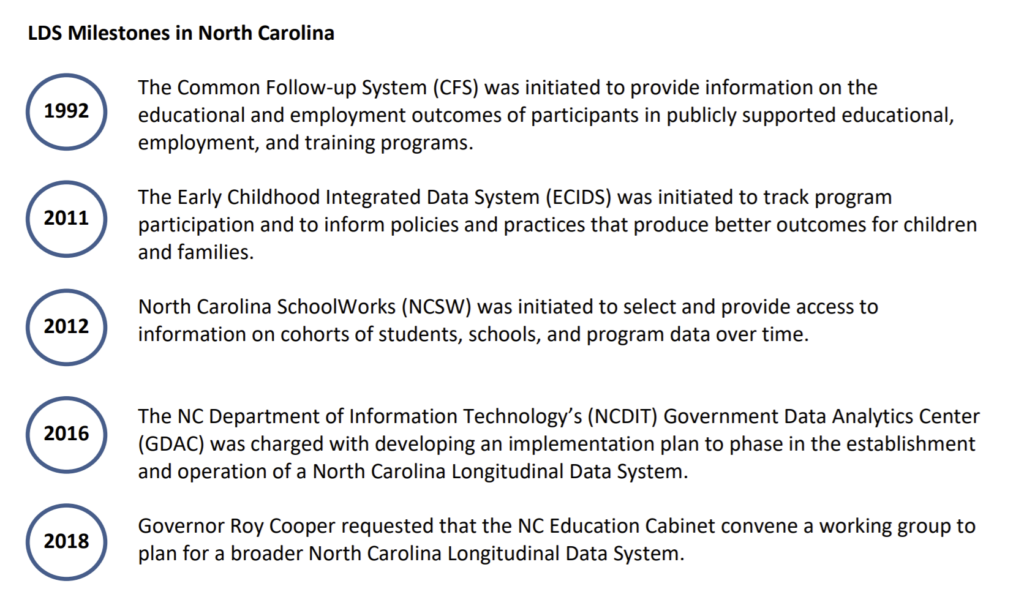
In January 2018, the Education Cabinet created a working group to improve data sharing among members. That group identified the need to strengthen the state’s longitudinal data system. Since then, a few steps have been taken to do so, including:
- Under state statute, there is a requirement for administrative rules that govern how the NCLDS works. The rules were approved in December 2020.
- A memorandum of understanding (MOU) that outlines how data will be shared among agencies and how the system will be leveraged has been signed by all current data contributors.
- The Hunt Institute drafted a research agenda that will guide how the state can use the NCLDS to best answer questions from policymakers and agencies.
Additionally, in August 2019, the Education Cabinet approved a measure for the Government Data Analytics Center (GDAC), housed within the NC Department of Information Technology, to hire a consultant to identify ways to modernize and strengthen the data system. In June 2020, the UNC-Chapel Hill Public Policy department and the Education Policy Initiative at Carolina (EPIC) completed the study.
Zach Ambrose, founder of Ambrose Strategy and one of the researchers of the study, presented on the findings at the meeting. He described the many groups from which the study drew input, including North Carolina education stakeholders, comparison states, and national groups.
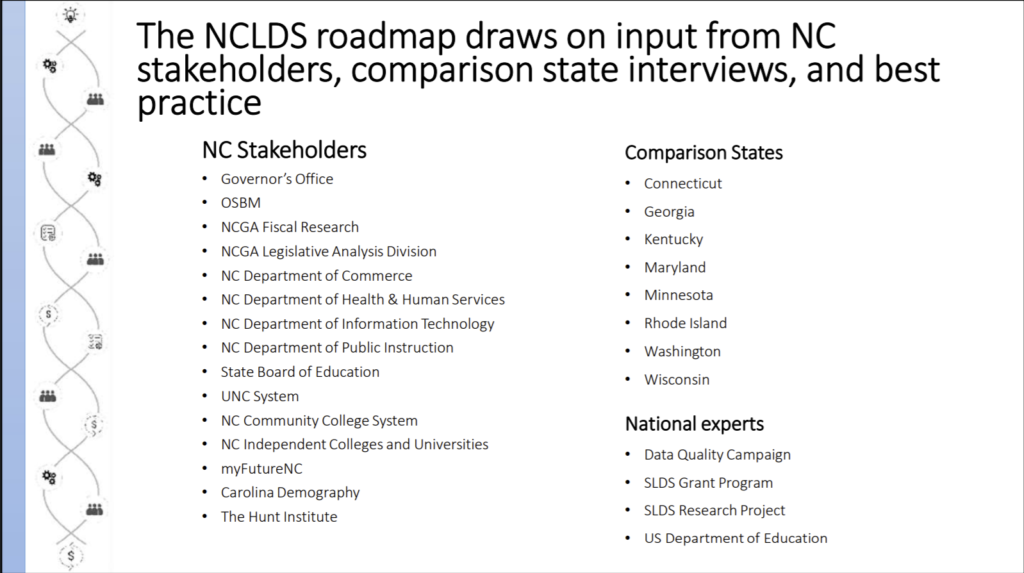
One thing that stood out from these interviews, Ambrose said, was consensus on the value of an integrated, modernized NCLDS. Interviewees mentioned the importance of leveraging it to answer questions around transitions between education systems and to drive continuous improvement and strategic planning.
Another theme from the interviews was the importance of trust.
“Stakeholders said that their trust had been strained in the past based on ambiguity around location, leadership, and purpose for existing LDS’s, and that having trust between agencies, between partners, is really going to be vital to a successful NCLDS,” said Ambrose.
Then, Ambrose outlined the study’s eight recommendations, shown below.
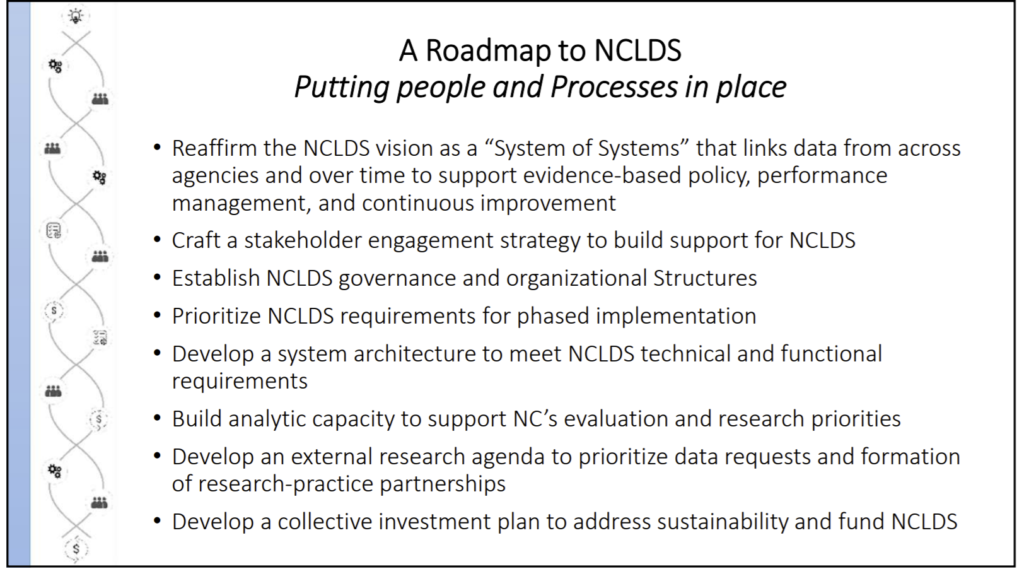
The third recommendation relates to governance, which Ambrose said is critical to trust. The study recommends setting up an executive committee that would function as the decision-making body for NCLDS. It would set policies and approve priorities. The study also recommends hiring an executive director that would implement the executive committee’s decisions. And, the study recommends that the NCLDS be housed within GDAC due to its standing as a neutral entity that has secured stakeholder trust.
The fourth recommendation relates to prioritizing the users of the NCLDS. The study recommends starting with policymakers — like members of the General Assembly, agency leaders, and members of the governor’s office — who would use the NCLDS to set policy. The second group would be program administrators, such as school district leaders, who would use the NCLDS to implement policies effectively. The third group would be external researchers.
The final recommendation relates to creating an action plan, which includes funding to sustain the NCLDS. The study recommends that state appropriations fund the core functionality of NCLDS, rather than grant funding. Ambrose said that signals it will be a long-term effort and allows the system to be designed to meet state needs.
Read more about each recommendation in the study’s executive summary or in the final report.
Geoff Coltrane, Cooper’s senior education advisor, presented four next steps to the Education Cabinet for their review. The Cabinet’s working group chose these based on the study’s findings.
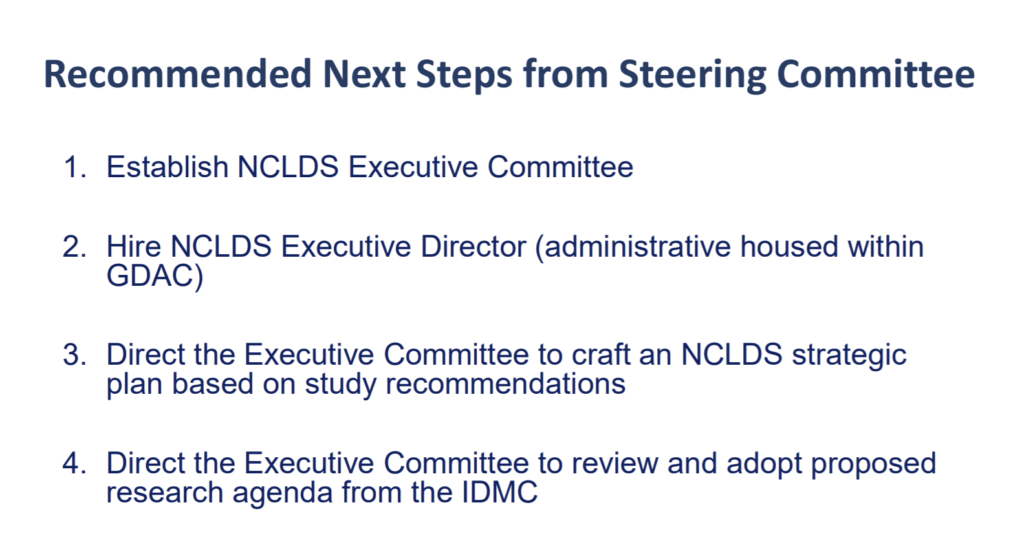
Here are the recommended members for the executive committee.

Mandy Cohen, Cabinet member and secretary of North Carolina’s Department of Health and Human Services, asked what the timeline would be for using the NCLDS for action. Coltrane clarified that while these recommended next steps are meant to strengthen the NCLDS, the system can also be leveraged to answer research questions where data is available.
“I think that’s not only important to deliver those answers, but in terms of really building support and helping other stakeholders see value in NCLDS, that’s a really valuable approach in terms of getting the General Assembly and others on board — because they can see what’s possible,” said Ambrose.
Catherine Truitt, Cabinet member and state superintendent of public instruction, asked about establishing a contract with the National Student Clearinghouse to include that system’s data in the NCLDS. Ambrose recommended beginning with integrating the system’s existing data sources and then turning to adding additional sources.
Cooper asked for objections to the four next steps highlighted above. Truitt asked to add myFutureNC to the membership list for the executive committee. With that addition, the next steps were endorsed by the Cabinet.
DRIVE Task Force
The Education Cabinet also heard a presentation from Dr. Anthony Graham, chair of the DRIVE Task Force and provost of Winston-Salem State University.
The DRIVE Task Force, which stands for Developing a Representative and Inclusive Vision for Education, recently published a final report that includes recommendations for diversifying North Carolina’s teacher workforce.
Graham described the state of teacher diversity in North Carolina, noting that 79% of teachers are white while about 53% of students are students of color.
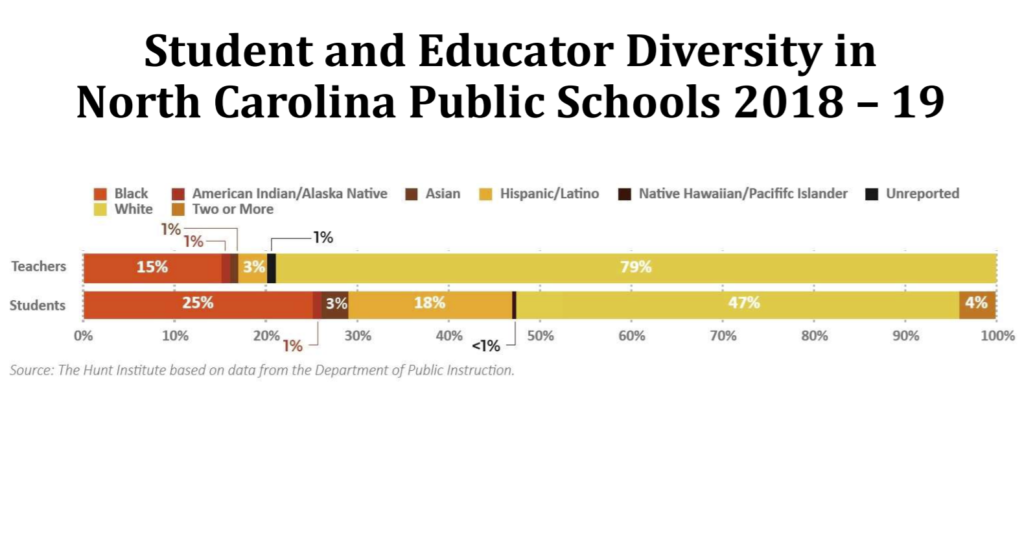
He went on to describe the report’s recommendations and strategies, along with short-term strategies for immediate implementation. Those short-term strategies include supporting pathways from community colleges to educator preparation programs (EPP) through articulation agreements and reallocating resources to intentionally recruit first- and second-year college students into EPPs (with a focus on students of color).
Following Graham’s report, numerous Cabinet members weighed in on strategies to recruit a more diverse teacher workforce, including recruiting teaching assistants, expanding the NC Teaching Fellows Program, and introducing students to the teaching profession earlier. Graham noted that those strategies, and many others, are all included in the report.
“The question now becomes: Will we provide the investments, financially and otherwise, to ensure that we can execute these different ideas so that they become sustainable?” he said. “That’s the key question — are we willing to invest?”
View Graham’s full presentation here.
As a next step, Cooper asked each Cabinet member to designate someone that would meet as a group to assess the short-term strategies in the DRIVE report. That group will identify existing resources that could be leveraged to implement them immediately. Then, they would determine capacity restraints that need to be addressed in order to fully implement the selected strategies.




